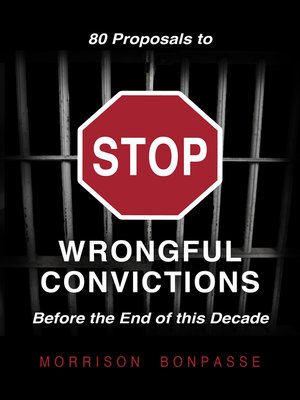80 Proposals to STOP Wrongful Convictions
ebook ∣ Before the End of This Decade
By Morrison Bonpasse

Sign up to save your library
With an OverDrive account, you can save your favorite libraries for at-a-glance information about availability. Find out more about OverDrive accounts.
Find this title in Libby, the library reading app by OverDrive.



Search for a digital library with this title
Title found at these libraries:
| Library Name | Distance |
|---|---|
| Loading... |
The United States has a large wrongful conviction problem, and it's a travesty. This book presents 80 Proposals to STOP the problem.
The forensic DNA revolution, which produced its first wrongful conviction exoneration in 1989, has led to some changes in the U.S. criminal justice system but not nearly enough.
In the history of criminal justice systems, the people wrongly convicted over the centuries always knew what had happened to them, but few others knew or cared. Now we all know.
Despite such books as Edwin Borchard's 1932 classic, Convicting the Innocent - Sixty-five Actual Errors of Criminal Justice, wrongful convictions were thought in the early 20th century to be improbable or extremely rare.
In 1963, Eugene Block published The Vindicators, which, if written today, might have been named The Exonerators, to align with the current word usage. A year after Eugene Block's book, Edward Radin published The Innocents, which he began with a discussion of "The Myth," that "innocent people are not convicted for crimes they have not committed."
The four Appendices of this book are lists of books relating to wrongful convictions before and after 1989.
Appendix A is a list of general books, with some articles about wrongful conviction, organized by date. Appendix B has a list of books about specific cases of exoneration organized by state and date. Appendix C has a list of books in support of claims of innocence by those convicted of crimes, also organized by state and date. Appendix D provides a short list of novels where wrongful conviction is an issue.
By December 31, 2014, twenty-five years after Gary Dotson was exonerated by the vacating of his rape conviction, the count of exonerations in the National Registry of Exonerations had risen to 1,520, including 67 in 1989.
The sad and intolerable truth is that even with the highly publicized exonerations of an ever- increasing number of people, but still fewer than 100 per year, there are many more innocent people being convicted each year than are being exonerated. As will be seen in Chapter 1, that 100 is less than one percent of the people likely to suffer wrongful convictions every year. Thus, the vast majority (99+ percent) of wrongfully convicted people either serve their sentences or die in prison.
This book presents a call-to-action to achieve two goals within five years:
1. reduce wrongful convictions in the U.S. to .1 percent.
2. reduce the percentage of wrongly convicted inmates in prison to .1 percent, by liberating thousands of wrongly convicted inmates.
The last clause of title of this book, "before the end of this decade," comes from President John Kennedy's setting the goal for the U.S. to land a person on the Moon by the end of the 1960s.
This book is being published in January 2015, which is only five years from the end of this decade of the 2010s, but the country now knows a lot more about the problems of wrongful convictions than the U.S. knew in 1962 about landing a person onto the Moon.
For practical purposes, the book title's goal to "STOP" wrongful convictions is the same as "REDUCE TO .1%," which is one in one thousand.
Themes of this book.
The book provides 80 practical proposals for national reform of the criminal justice system in order to reduce the frequency of wrongful conviction to .1 percent or less
There are several themes which permeate the book.
1. Make Truth and Justice the highest priority goals of the Criminal Justice System and for its participants.
2. Ameliorate the Adversary Process.
3. Take a systematic look at the criminal justice process.
These 80 proposals by no means include the...







